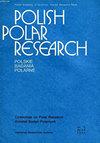Multi-method geophysical mapping of ground properties and periglacial geomorphology in Hans Glacier forefield, SW Spitsbergen
IF 0.8
4区 地球科学
Q4 ECOLOGY
引用次数: 2
Abstract
: This article presents the results of a geophysical survey from which detailed images of glacial and periglacial landforms and subsurface structures were obtained. Sediments and landforms on newly deglaciated terrain can be used to reconstruct the extent and character of glaciers in the past and add to the understanding of their response to climate and environmental changes. To derive spatial information from complex geomorphological terrain, joint interpretation of three non-intrusive geophysical methods were applied: Electrical Resistivity Tomography (ERT), Ground Penetrating Radar (GPR), and time-lapse Seismic Tomography. These were used to identify subsurface structures in the forefield of the retreating Hans Glacier in SW Spitsbergen, Svalbard. Three main zones were distinguished and described: outwash plain, terminal moraine from the last glacial maximum, and glacial forefield proximal to the glacier front. Geophysical profiles across these zones reveal information on glacio-fluvial sediment thickness and structure, ice thickness and structure, and bedrock topography. The freezing-thawing effect of the active layer has a strong and deep impact, as demonstrated by variations in P-wave velocity in the obtained outcomes. The results are discussed in the context of the current climate in Svalbard. This study provides a snapshot of ground parameters and the current state of the subsurface in southern Spitsbergen. The boundary between sediment-bedrock layers was estimated to be from 5 to 20 m in depth. It is the first such extensive description of periglacial structures in the forefield of the Hans Glacier, utilising the longest ERT profile (1500 m) in Svalbard together with deep GPR and precise seismic tomography.斯匹次卑尔根西南汉斯冰川前田地物性和冰缘地貌的多方法地球物理填图
本文章由计算机程序翻译,如有差异,请以英文原文为准。
求助全文
约1分钟内获得全文
求助全文
来源期刊

Polish Polar Research
ECOLOGY-GEOSCIENCES, MULTIDISCIPLINARY
CiteScore
2.00
自引率
7.70%
发文量
0
审稿时长
>12 weeks
期刊介绍:
The quarterly Polish Polar Research edited by the Committee on Polar Research of the Polish Academy of Sciences is an international journal publishing original research articles presenting the results of studies carried out in polar regions.
All papers are peer-reviewed and published in English.
The Editorial Advisory Board includes renowned scientist from Poland and from abroad.
 求助内容:
求助内容: 应助结果提醒方式:
应助结果提醒方式:


